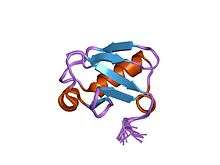ASPSCR1
| View/Edit Human | View/Edit Mouse |
Tether containing UBX domain for GLUT4 (TUG) is a protein that in humans is encoded by the ASPSCR1 gene.[3][4][5]
This gene is a candidate gene for alveolar soft part sarcoma (ASPS). It has been found that ASPSCR1 can undergo oncogenic rearrangement with transcription factor TFE3 gene, creating an aberrant gene that is a stronger transcriptional activator than TFE3 alone.[6] This fusion oncogene encodes for a chimeric transcription factor, which is responsible for the production of multiple molecules that contribute to ASPS and also to renal cell carcinomas.[7] Several alternatively spliced transcript variants of this gene have been described, but their full length nature has not been determined.[5]
References
- ↑ "Human PubMed Reference:".
- ↑ "Mouse PubMed Reference:".
- ↑ Ladanyi M, Lui MY, Antonescu CR, Krause-Boehm A, Meindl A, Argani P, Healey JH, Ueda T, Yoshikawa H, Meloni-Ehrig A, Sorensen PH, Mertens F, Mandahl N, van den Berghe H, Sciot R, Dal Cin P, Bridge J (Mar 2001). "The der(17)t(X;17)(p11;q25) of human alveolar soft part sarcoma fuses the TFE3 transcription factor gene to ASPL, a novel gene at 17q25". Oncogene. 20 (1): 48–57. doi:10.1038/sj.onc.1204074. PMID 11244503.
- ↑ Joyama S, Ueda T, Shimizu K, Kudawara I, Mano M, Funai H, Takemura K, Yoshikawa H (Oct 1999). "Chromosome rearrangement at 17q25 and xp11.2 in alveolar soft-part sarcoma: A case report and review of the literature". Cancer. 86 (7): 1246–50. doi:10.1002/(SICI)1097-0142(19991001)86:7<1246::AID-CNCR20>3.0.CO;2-4. PMID 10506710.
- 1 2 "Entrez Gene: ASPSCR1 alveolar soft part sarcoma chromosome region, candidate 1".
- ↑ Kobos R, Nagai M, Tsuda M, Merl MY, Saito T, Laé M, Mo Q, Olshen A, Lianoglou S, Leslie C, Ostrovnaya I, Antczak C, Djaballah H, Ladanyi M (Jan 2013). "Combining integrated genomics and functional genomics to dissect the biology of a cancer-associated, aberrant transcription factor, the ASPSCR1-TFE3 fusion oncoprotein". The Journal of Pathology. doi:10.1002/path.4158.
- ↑ Lazar AJ, Lahat G, Myers SE, Smith KD, Changye Z, Wei-Lien W, Lopez-Terrada D, Lev D (Dec 2009). "Validation of potential therapeutic targets in alveolar soft part sarcoma: an immunohistochemical study utilizing tissue microarray". Histopathology. 55 (6): 750–755. doi:10.1111/j.1365-2559.2009.03436.x.
Further reading
- Heimann P, El Housni H, Ogur G, et al. (2001). "Fusion of a novel gene, RCC17, to the TFE3 gene in t(X;17)(p11.2;q25.3)-bearing papillary renal cell carcinomas.". Cancer Res. 61 (10): 4130–5. PMID 11358836.
- Argani P, Antonescu CR, Illei PB, et al. (2001). "Primary renal neoplasms with the ASPL-TFE3 gene fusion of alveolar soft part sarcoma: a distinctive tumor entity previously included among renal cell carcinomas of children and adolescents.". Am. J. Pathol. 159 (1): 179–92. doi:10.1016/S0002-9440(10)61684-7. PMC 1850400
 . PMID 11438465.
. PMID 11438465. - Strausberg RL, Feingold EA, Grouse LH, et al. (2003). "Generation and initial analysis of more than 15,000 full-length human and mouse cDNA sequences.". Proc. Natl. Acad. Sci. U.S.A. 99 (26): 16899–903. doi:10.1073/pnas.242603899. PMC 139241
 . PMID 12477932.
. PMID 12477932. - Bogan JS, Hendon N, McKee AE, et al. (2003). "Functional cloning of TUG as a regulator of GLUT4 glucose transporter trafficking.". Nature. 425 (6959): 727–33. doi:10.1038/nature01989. PMID 14562105.
- Ota T, Suzuki Y, Nishikawa T, et al. (2004). "Complete sequencing and characterization of 21,243 full-length human cDNAs.". Nat. Genet. 36 (1): 40–5. doi:10.1038/ng1285. PMID 14702039.
- Gerhard DS, Wagner L, Feingold EA, et al. (2004). "The status, quality, and expansion of the NIH full-length cDNA project: the Mammalian Gene Collection (MGC).". Genome Res. 14 (10B): 2121–7. doi:10.1101/gr.2596504. PMC 528928
 . PMID 15489334.
. PMID 15489334. - Olsen JV, Blagoev B, Gnad F, et al. (2006). "Global, in vivo, and site-specific phosphorylation dynamics in signaling networks.". Cell. 127 (3): 635–48. doi:10.1016/j.cell.2006.09.026. PMID 17081983.
This article is issued from Wikipedia - version of the 5/19/2016. The text is available under the Creative Commons Attribution/Share Alike but additional terms may apply for the media files.

